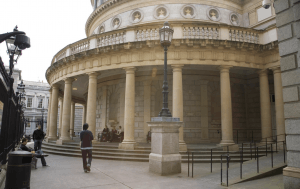Museums Forum
By UCL Careers, on 1 March 2018
Dr Danielle Thom – Curator of Making at the Museum of London (previously at V&A)
Jack Ashby – Manager of the UCL Grant Museum of Zoology
Stephanie O’Neill-Winbow – Family and Community Learning Officer at the London Transport Museum
—
The Museums Forum was held on the 16th November, as part of the Museums and Cultural Heritage Week. The three speakers were working in various roles and at different stages of their career, and as such, there were a range of interesting ideas and views expressed.
The panellists shared what they consider to be the most interesting and rewarding aspects of their role. Danielle, from the Museum of London, spoke about physically and emotional connecting with the past, like that time she held Michelangelo’s thumbprint. However, perhaps unsurprisingly, engaging the public seemed to be something enjoyed by all; helping someone or indeed whole families see what they see and so connect with the past.
Stephanie shared some of the understanding she tries to impart to visitors. The London Transport Museum is not solely about transport. London has been shaped into the city it is today is because of transport. Hence, the museum is communicating the social history of London, contributing to one’s understanding of London’s development. But it’s not all about the past. Interestingly, for a museum of zoology, the Grant’s main aim is more contemporary than one may appreciate at first glance. As a university museum a primary role of the Grant Museum is to make UCL’s academic research relevant and enjoyable to the public, for example various art exhibitions interpreting current research.
Whether past or contemporary, they also enjoy applying their creative skills as they adapt displays or create exhibitions for the public. Museums are reliant on visitors for their continued existence, and so there is an increasing need to be creative and develop new practices in their public engagement. This experimentation and subsequent learning can be very exciting. A word of warning from Danielle though; the work of a curator can be quite menial at times (crawling through cupboards, carting trolleys, etc.) so be prepared to get stuck in.
It was suggested that the difference between those who get jobs in this area and those who don’t relates to understanding the reason why museums do the activities they do. Through some work experience one can easily learn how to write documentations, labels, school workshops, how to deliver family learning sessions etc, but an applicant needs to demonstrate an understanding of the reason and strategy behind the display or event. So when you are next visiting a museum think about why the museum chose to organise and communicate this material, and not another, in the way they did. Don’t be afraid to ask someone in the museum.
There were further important messages around transitioning into a substantive position. Stephanie shared her challenges in securing permanent employment. While volunteering she demonstrated her determination and her ability, “if something needed to be done, I’d do it”, and so the organisation advised her to become a freelancer. There were no permanent positions but they could hire her for projects. This was not what she wanted, but she tried it out. She started out delivering school sessions, but after a time was running the whole family programme. She believes this ‘jump’ in level of role was solely down to going freelance. She believes it would have taken her years longer to get to the same level if she had of secured a permanent position from the beginning. From this experience, she was able to gain a part time role that led directly to a full-time permanent position. Danielle suggested that one should thread the fine line between being flexible and strategic. Don’t get so narrow in your specialism that you lose the ability to be a generalist. Don’t be too niche and so close opportunities off. Equally, if you don’t have a particular area of expertise think carefully about how you will position yourself. Perhaps this could be supplemented with by some experience communicating or educating the public in art, history, and so on. PhDs are not generally a prerequisite but can help (showing motivation and research skills), however you may end up working in an area outside of your topic of study. Danielle suggested that museums with more of an art focus, compared to social or scientific focus, tend to expect applicants to hold a PhD.
Leicester museums job desk which is updated on a Thursday afternoons was highlighted as the best job site for this area of work.
 Close
Close


